

Literary Terms and Definitions. Drama Intro. Text and Theatre When one deals with dramatic texts one has to bear in mind that drama differs considerably from poetry or narrative in that it is usually written for the purpose of being performed on stage.
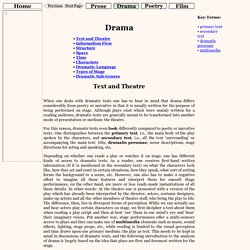
Although plays exist which were mainly written for a reading audience, dramatic texts are generally meant to be transformed into another mode of presentation or medium: the theatre. For this reason, dramatic texts even look differently compared to poetic or narrative texts. One distinguishes between the primary text, i.e., the main body of the play spoken by the characters, and secondary text, i.e., all the text ‘surrounding’ or accompanying the main text: title, dramatis personae, scene descriptions, stage directions for acting and speaking, etc. Depending on whether one reads a play or watches it on stage, one has different kinds of access to dramatic texts. The main features one can look at when analysing drama are the following: Drama Terms: 15 Brief Definitions. Home | Literary Movements | Timeline | American Authors | American Literature Sites | Bibliographies | Site Updates Drama Terms: 15 Brief Definitions Go to Fiction Terms or Poetry Terms Test yourself with this self-grading online quiz.
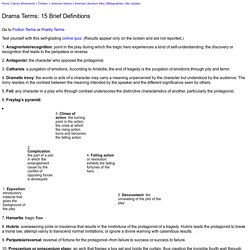
(Results appear only on the screen and are not reported.) 1. 2. 3. 4. 5. 6. 7. 8. 9. Poetry01. What is Poetry?
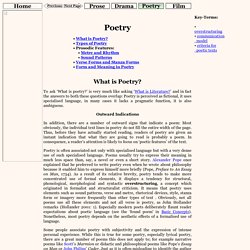
To ask ‘What is poetry?’ Is very much like asking ‘What is Literature?’ Poetic Devices and Literary Terminology. Poetic Devices and Literary Terminology Mr.
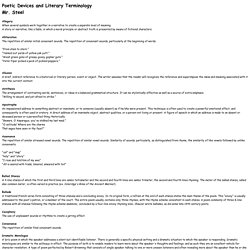
Steel Allegory When several symbols work together in a narrative to create a separate level of meaning. A story or narrative, like a fable, in which a moral principle or abstract truth is presented by means of fictional characters. Alliteration The repetition of similar initial consonant sounds. "From stem to stern. " "Yanked out yards of yellow yak yutt. " "Great green gobs of greasy gooey gopher guts. " "Peter Piper picked a peck of pickled peppers. " Allusion A brief, indirect reference to a historical or literary person, event or object.
Antithesis The arrangement of contrasting words, sentences, or ideas in a balanced grammatical structure. "Willing to wound, and yet afraid to strike. " Apostrophe An impassioned address to something abstract or inanimate, or to someone (usually absent) as if he/she were present. Poetry. I.6.
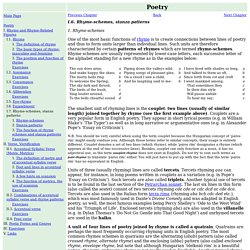
Rhyme-schemes, stanza patterns 1. Rhyme-schemes One of the most basic functions of rhyme is to create connections between lines of poetry and thus to form units larger than individual lines. Poetry Terms: 40 Brief Definitions. Home | Literary Movements | Timeline | American Authors | American Literature Sites | Bibliographies | Site Updates Poetry Terms: Brief Definitions Go to Drama Terms or Fiction Terms Try the Online Quiz on Poetry Terms to test your knowledge of these terms.You might also like to try the Online Quiz on Prosody to test your knowledge of scanning poetry.
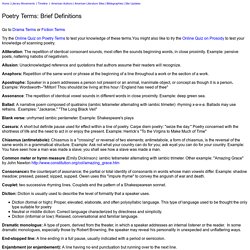
Alliteration: The repetition of identical consonant sounds, most often the sounds beginning words, in close proximity. Example: pensive poets, nattering nabobs of negativism. Glossary of Rhymes. The following terms occur frequently in discussions of poetry and critical writing, but not with absolute consistency.
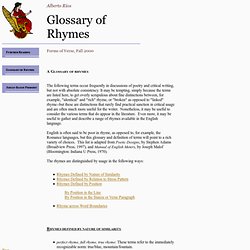
It may be tempting, simply because the terms are listed here, to get overly scrupulous about fine distinctions between, for example, "identical" and "rich" rhyme, or "broken" as opposed to "linked" rhyme--but these are distinctions that rarely find practical sanction in critical usage and are often much more useful for the writer. Nonetheless, it may be useful to consider the various terms that do appear in the literature. Rhyme and reason: how do we describe different types of rhymes? English has a rich vocabulary for rhyme, but names are unstable: in what follows, therefore, alternative names are sometimes provided in parenthesis.
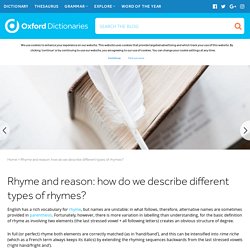
Fortunately, however, there is more variation in labelling than understanding, for the basic definition of rhyme as involving two elements (the last stressed vowel + all following letters) creates an obvious structure of degree. In full (or perfect) rhyme both elements are correctly matched (as in ‘hand/band’), and this can be intensified into rime riche (which as a French term always keeps its italics) by extending the rhyming sequences backwards from the last stressed vowels (‘right hánd/fright ánd’).
The obvious next step is half- (or imperfect, near, slant) rhyme, with only one element correctly matching, which divides into vowel rhyme, with the same last stressed vowel but different following letters (‘hand/hang’), and pararhyme, with the same letters following different vowels (‘hand/bind’). Discourse01. Prose Probably most literature that is read today is written in prose, that is in non-metrical, ‘ordinary’ language.
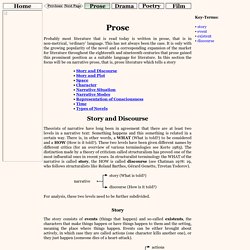
This has not always been the case. It is only with the growing popularity of the novel and a corresponding expansion of the market for literature throughout the eighteenth and nineteenth centuries that prose gained this prominent position as a suitable language for literature. In this section the focus will be on narrative prose, that is, prose literature which tells a story Story and Discourse Theorists of narrative have long been in agreement that there are at least two levels in a narrative text: Something happens and this something is related in a certain way. For analysis, these two levels need to be further subdivided.
Story The story consists of events (things that happen) and so-called existents, the characters that make things happen or have things happen to them and the setting, meaning the place where things happen. Fiction Terms. Home | Literary Movements | Timeline | American Authors | American Literature Sites | Bibliographies | Site Updates Fiction Terms: 35 Brief Definitions Go to Drama Terms or Poetry Terms.
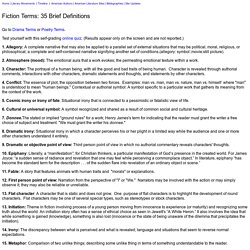
Test yourself with this self-grading online quiz. (Results appear only on the screen and are not reported.) Short Stories. B. Terminology Main Characters: are characters who are central to the conflict. Minor Characters: are characters who are not central to the conflict. Protagonist: is the chief character of a story, on whom our interest centres. Antagonist: is the character or force pitted against the protagonist; can be one or many.